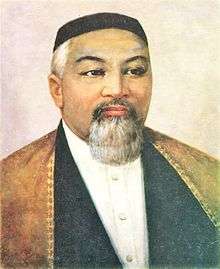Abai Qunanbaiuli
| Абай Құнанбайұлы Abay Qunanbayulı Абай Құнанбаев اباي قۇنانبايۇلى Abai Kunanbaev | |
|---|---|
 | |
| Born |
Abay (Ibrahim) Qunanbayuli 10 August 1845 Karauyl, Abay District, East Kazakhstan Province, Kazakhstan |
| Died |
6 July 1904 (aged 58) Karauyl, Abay District, East Kazakhstan Province, Kazakhstan |
| Occupation | Akyn |
| Nationality |
|
| Ethnicity | Kazakh |
| Notable works | The Book of Words |
Abay (Ibrahim) Qunanbayuli (Kazakh: Абай (Ибраһим) Құнанбайұлы , Abay (Ïbrahïm) Qunanbayulı, اباي (ٸبراهٸم) قۇنانبايۇلى) (August 10, 1845 – July 6, 1904) was a Kazakh poet, composer and philosopher. He was also a cultural reformer toward European and Russian cultures on the basis of enlightened Islam.
Life
Early life and education

Abay was born in what is today the selo of Karauyl, in Abay District, East Kazakhstan Province; the son of Qunanbay and Uljan, Qunanbay's second wife, they named him Ibrahim, but because of his brightness, he soon was given the nickname "Abay" (meaning "careful"), a name that stuck for the rest of his life. His father's economic status enabled the boy to attend a Russian school in his youth, but only after he had already spent some years studying at a madrasah under Mullah Ahmet Ryza. At his school in Semipalatinsk, Abay encountered the writings of Mikhail Lermontov and Alexander Pushkin.
Contributions
Abay's main contribution to Kazakh culture and folklore lies in his poetry, which expresses great nationalism and grew out of Kazakh folk culture. Before him, most Kazakh poetry was oral, echoing the nomadic habits of the people of the Kazakh steppes. During Abay's lifetime, however, a number of important socio-political and socio-economic changes occurred. Russian influence continued to grow in Kazakhstan, resulting in greater educational possibilities as well as exposure to a number of different philosophies, whether Russian, Western or Asian. Abay Qunanbayuli steeped himself in the cultural and philosophical history of these newly opened geographies. In this sense, Abay's creative poetry affected the philosophical thinking of educated Kazakhs.
Legacy

The leaders of the Alash Orda movement saw him as their inspiration and spiritual predecessor.
Contemporary Kazakh images of Abay generally depict him in full traditional dress holding a dombra (the Kazakh national instrument). Today, Kazakhs revere Abay as one of the first folk heroes to enter into the national consciousness of his people. Almaty State University is named after Abay, so is one of the main avenues in the city of Almaty. There are also public schools with his name.
The Kazakh city of Abay is named after him.
Among Abay's students was his nephew, a historian, philosopher, and poet Shakarim Qudayberdiuli (1858–1931).
Statues of him have been erected in many cities of Kazakhstan, as well as in Moscow.
A film on the life of Abay was made by Kazakhfilm in 1995, titled Abai. He is also the subject of two novels and an opera by Mukhtar Auezov, another Kazakhstani writer.
Another film describing his father's life was made in December 2015, titled "Qunanbai".
Works
Abay also translated into Kazakh the works of Russian and European authors, mostly for the first time. Translations made by him include poems by Mikhail Lermontov, Johann Wolfgang von Goethe, Lord Byron, Ivan Krylov's Fables and Alexander Pushkin's Eugene Onegin.
Abay's major work is The Book of Words (Kazakh: қара сөздері, Qara sözderi), a philosophic treatise and collection of poems where he encourages his fellow Kazakhs to embrace education, literacy, and good moral character in order to escape poverty, enslavement and corruption. In Word Twenty Five, he discusses the importance of Russian culture, as a way for Kazakhs to be exposed to the world's cultural treasures.
Moscow protests in May 2012
On May 9, 2012, following two days of protests in Moscow following Vladimir Putin's inauguration as President of the Russian Federation for the third term, protesters set up camp near the monument to Abai Qunanbaiuli on the Chistoprudny Boulevard in central Moscow, close to the embassy of Kazakhstan. The statue quickly became a reference point for the protest's participants.[1] OccupyAbai was among the top ranking hash-tags in Twitter for several days thanks to Russian opposition leader Alexey Navalny who set up a meeting with his followers next to Abai Kunanbayev’s monument in Moscow that he called "a monument to some unknown Kazakh". This spurred a wave of indignation among ethnic Kazakhs who highly esteem Abai. This also brought Abai's poetry into the top 10 AppStore downloads.[2]
References
- ↑ Vinokurova, Ekaterina (May 10, 2012). "May protests in Moscow: The Whats and Whys". Gazeta.ru. Archived from the original on 28 November 2014. Retrieved 12 May 2012.
- ↑ "Russia had to provide security of Kazakhstan embassy during OccupyAbai campaign". Tengrinews.kz English. Retrieved 18 May 2012.
External links
| Wikisource has original works written by or about: Abai Qunanbaiuli |
| Wikimedia Commons has media related to Abay Qunanbayuli. |
- Biography of Abay
- Site dedicated to Abay
- «Kara Sozder» (Book of Words) (Kazakh)
- Poems by Abay (Russian)
- IMDB page for the 1995 biopic